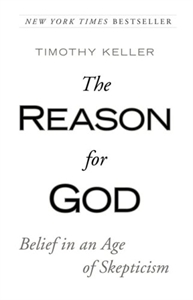In his new book, Why God Won’t Go Away, McGrath turns his intellect and insight toward the movement known as New Atheism (a specific movement that goes beyond a simple denial of the existence of God to the nearly militant destruction of such a view), revealing it as “a hopelessly simplistic view that cannot be sustained in the light of subsequent scholarly research” (page 6). That is one of the beauties of this author – he is a Christian and a scholar, when much of modern media and general public opinion would suggest one should be one or the other.
Category Archives: Apologetics
The Reason for God
 The Reason for God: Belief in the Age of Skepticism
The Reason for God: Belief in the Age of Skepticism
Timothy Keller
Penguin Group
Published in 2008
ISBN: 9780525950493
Review by Mike Meiser
If you are looking for a book that will inform you on how to make a defense of your Christian faith to a secular world, look no further than Timothy Keller’s The Reason for God: Belief in an Age of Skepticism. Mr. Keller’s book is the ultimate apologetic that will appeal to not only the scholar but also the layman. His writing style is clear and concise, and the way in which he presents information is easy to understand. However, even in light of its simplicity, it remains intellectually compelling.
Mr. Keller’s book is divided into two parts. The first part is concerned with showing why a secular worldview is as much if not more of a “leap of faith” as that of a religious one. He completes this task by debunking many of the most popular arguments against the conservative, Evangelical worldview. The arguments covered include such topics as Christianity’s exclusive nature, the problem of evil and suffering, God’s love vs. God’s wrath, religion and science, and the authority of the Scripture.
The second part of the book is concerned with making positive arguments for the validity of an Evangelical worldview. His arguments are of two sorts, historical and existential. These arguments range from Christianity’s explanatory superiority over other worldviews to topics such as the historical validity of the resurrection of Christ. I found his arguments to be quite compelling and encouraging to my faith.
I highly recommend The Reason for God to anyone who is interested in gaining a greater understanding of how to engage the contemporary, postmodern mind. It is very evident that Mr. Keller understands the present condition of Western thought, and he has taken steps to engage that way of thinking in an active dialogue. He understands that many of our arguments have become stale and outdated; however, Tim Keller has shown that one does not have to compromise traditional beliefs in order to appeal to modern minds.
